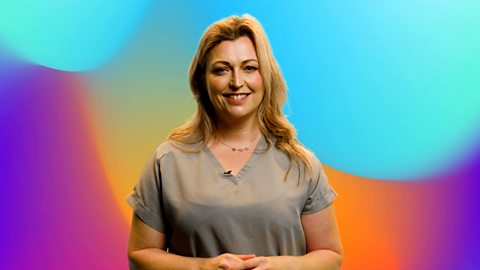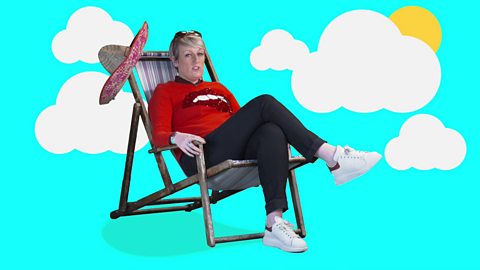The challenge
Video summary
Food vlogger Gayle Chapman explains how when you borrow money from a bank or building society, they charge interest (money you pay back on top of what you've borrowed). What it costs depends on the interest rate and how long you take to pay back your debt.
There are other forms of borrowing too; overdrafts, credit cards, student loans and mortgages. 'Payday' loans can have sky-high interest rates.
Lenders check your payment history to see if you'll be able to pay the money back. So, if you need a loan, make sure you have a plan for how to repay it.

Challenge round-up
Gayle Chapman summarises the key considerations for the challenge.
Teacher notes
Watch the video and then split the class into pairs or groups to work on the task set in Part 1 of the film. After the activity time has passed re-group and watch Part 2 of the video to see how Gayle would have gone about things.
Choose from a selection of activities to help students learn more about credit and debt.
Before watching
Questions to get the class thinking and talking:
- What is debt?
- What is credit?
- What should you consider before borrowing money?
Establish 'debt' is money you owe and 'credit' money you borrow. Before you borrow money, you should know how much you'll have to pay back, how you'll afford it and when you'll have to do it.
Using the film
You may wish to play the films twice: once straight through and once with pauses, to take students' comments and questions. Encourage the students to make notes as they watch.
After watching
Role-play - Ask the students why they might 'ask for credit' (apply for a loan). The class could list reasons. Point out store cards and mobile phone contracts are credit agreements.
Invite several students to play the role of someone approaching a bank to borrow £1,000. (You will take the role of bank manager!)Interview each applicant, asking questions such as:
- Why do you need this loan?
- Have you considered the alternatives?
- Are you employed?
- What is your monthly income?
- What are your outgoings?
- How long a period do you want the loan to run?
- What is your credit history like?
- Can you supply documents to support your application? (e.g., bank statements, payslips)
Activity ideas
- Glossaries - Students could compile glossaries of financial terms used in the film clip, along with their own definitions. This encourages them to clarify their understanding of key vocabulary.
Terms might include: 'credit', 'debt', 'interest', 'interest rate', 'Annual Percentage Rate (APR)', 'overdraft', 'loan'.
- Missing word puzzles - On the blackboard or onscreen, display the following paragraph, with the words in brackets missing. Ask students to fill the gaps.
An overdraft is short-term borrowing, best used for emergencies. The bank charges interest AND a daily, weekly or monthly fee. Spend more than you have in the bank without their permission and this unauthorised overdraft will cost you a LOT more. If you're about to go overdrawn, talk to your bank and agree a cheaper authorised overdraft.
Ask students to devise similar missing-word puzzles about other forms of borrowing.
- Ask students to consider why it might be easy to get into debt. Consider researching all the different ways there are to borrow money from bank loans to credit cards to online ÔÇÿpay in threeÔÇÖ platforms that appear on websites. Ask them to research what support is available and how to go about getting yourself out of debt.
Point out that, even if the APR and monthly payments seem low, when a loan runs for a long time it ends up costing a lot to borrow a little.
Invite each pair of students to draw leaflets advertising three different ways to get support for debt and/or to help get out of debt, or how to avoid getting into debt in the first place.
- Alternatives - Ask the question 'are there alternatives to borrowing money?' The class could list suggestions, such as: 'save up, wait until you've been paid, cut back on other spending, do some overtime, sell something to raise the cash, choose a cheaper item, or consider if you really need to buy something at all.'
Supported learning and SEN
Students could (with any necessary support) take a screengrab from Gayle ChapmanÔÇÖs film and add their own speech bubble, e.g., 'tell the bank before you go overdrawn'. A collection of 'Gayle says' captures and captions could form a financial education comic strip.
Closing the lesson
Ask students to try out their missing-word puzzles on the class.
This is a fun and snappy way to revisit the lesson material, reinforce the learning and check the students' understanding.
Follow-up task
Ask the class to research online the differences between credit and debit cards. Students could draw up a table comparing the two types of card.
This short film meets and extends curriculum requirements for financial literacy at:
- Key Stage 3 and Key Stage 4 in England (Citizenship and Personal, Social, Health and Economic Education)
- Wales (Mathematical Development and Personal and Social Education)
- Northern Ireland (Mathematics and Numeracy and Learning For Life and Work)
- Third and Fourth Level and the Senior Phase in Scotland (Mathematics and Numeracy, Social Studies and Learning, Life and Work).
Where next?
University budget challenge with Cat the Vet. videoUniversity budget challenge with Cat the Vet
Vet and TikTok star Cat Henstridge (Cat The Vet ) offers tips on budgeting for university, before setting a related challenge for students.

Tax budget challenge with Cel Spellman. videoTax budget challenge with Cel Spellman
Actor and presenter Cel Spellman explains how the tax system works and sets a related tax budget challenge.

Long-term saving challenge with Iona Bain. videoLong-term saving challenge with Iona Bain
Financial journalist and author Iona Bain explains the importance of saving and sets a long-term saving challenge.

Sticking to a budget challenge with Liam MacDevitt. videoSticking to a budget challenge with Liam MacDevitt
Former professional footballer Liam MacDevitt sets students a challenge to plan and stick to a budget ahead of a trip with friends to a football match.

Iona Bain's money jargon busters. videoIona Bain's money jargon busters
In these short videos for secondary schools Morning Live's financial expert Iona Bain clearly explains pensions, mortgages, inflation, interest rates, credit and pensions.

Financial literacy with Steph McGovern. collectionFinancial literacy with Steph McGovern
In these short films for secondary schools Steph McGovern breaks down some key areas of study for the topic of financial literacy. These four short films will provide secondary students with a good understanding of credit, debt, pensions and how interest and taxation works.
